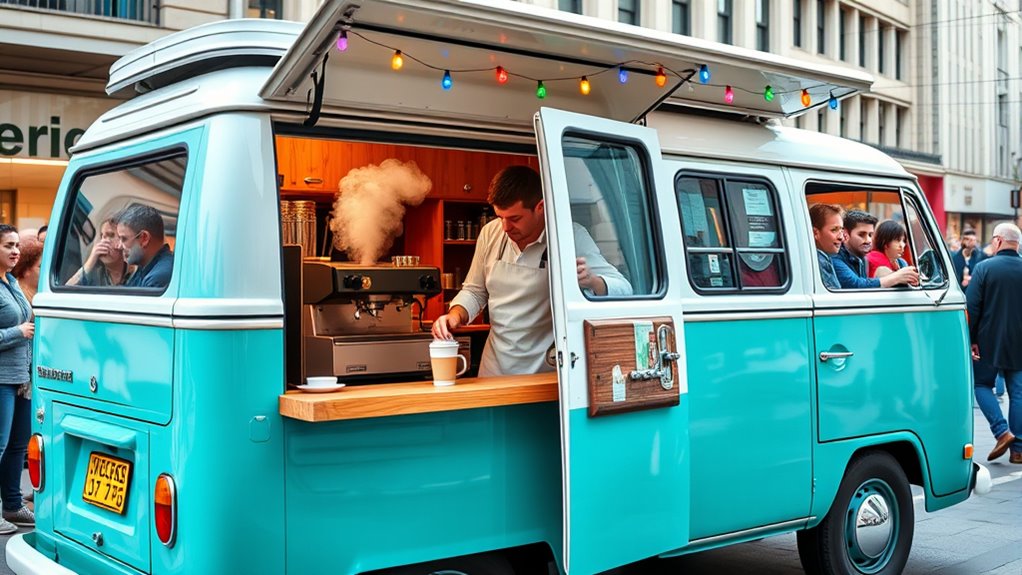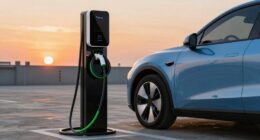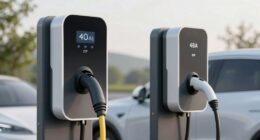A VW bus turned mobile coffee shop combines nostalgia, eye-catching branding, and flexibility to reach customers at events, busy streets, and festivals. You’ll find that this setup offers lower startup costs and quick setup times compared to traditional stores. Its charm attracts attention and fosters community engagement. By focusing on quality drinks and strategic locations, you can build a loyal customer base. Curious about how this iconic business runs? Keep exploring to discover the full story.
Key Takeaways
- A VW bus transformed into a mobile café offers nostalgic appeal and serves as a unique branding asset.
- The converted VW bus enables flexible location access, targeting high-foot-traffic areas and local events.
- It provides a cost-effective, quick-to-setup alternative to traditional brick-and-mortar coffee shops.
- Strong branding and social media marketing enhance customer engagement and loyalty for the VW bus business.
- The mobile model fosters community connections, offering personalized service and increasing brand visibility.

Imagine grabbing your morning coffee without leaving your neighborhood—thanks to the growing trend of mobile coffee shops on wheels. You might not realize it, but a coffee truck, or mobile café, has become a popular way for entrepreneurs to serve fresh brews with flexibility and style. Instead of a fixed storefront, these mobile cafés allow you to bring your coffee business directly to your customers, whether it’s at busy street corners, festivals, or office parks. This approach gives you the freedom to reach more people, adapt your location based on demand, and keep costs lower than traditional brick-and-mortar setups.
Bring your coffee directly to customers with a mobile café—flexible, affordable, and perfect for any location.
A standout example is a VW bus turned coffee truck, which combines nostalgia with modern entrepreneurship. This classic vehicle is transformed into a fully functional mobile café, complete with an espresso machine, storage for beans and supplies, and a sleek serving window. The charm of a VW bus adds personality and attracts attention, making it a memorable fixture wherever it parks. You get to enjoy the benefits of mobility while maintaining a cozy, inviting atmosphere. Customers love the personal touch that a mobile café offers—they see a friendly barista, smell fresh coffee, and experience a sense of community that’s hard to match with a traditional coffee shop.
Running a mobile café like this isn’t just about the vehicle; it’s about creating an experience. You’ll develop a menu tailored to your audience, often emphasizing high-quality beans, specialty drinks, and quick service. Being on wheels means you can attend local events, farmers markets, or popular spots where foot traffic is high. Plus, you can easily switch locations if sales slow down or if you want to test out new markets. Setting up is usually faster and less costly than opening a brick-and-mortar store, giving you the chance to start small and grow organically. Additionally, incorporating aesthetic wall organization solutions can help keep your mobile setup neat, organized, and visually appealing, enhancing the customer experience.
The key to success with a coffee truck or mobile café is branding and consistency. The VW bus, for example, becomes a visual icon that people recognize and seek out. You’ll want to create a strong identity, use social media to announce your locations, and build loyal customers who appreciate the convenience and quality you provide. Operating a mobile coffee business demands attention to logistics—like managing supplies, maintaining your vehicle, and staying compliant with health regulations—but the rewards are significant. You get to bring your passion for coffee directly to your community, building relationships and a reputation as the go-to spot for your neighborhood’s caffeine fix—all from the comfort of your own mobile café on wheels.
Frequently Asked Questions
How Do You Manage Inventory in a Mobile Setup?
You manage inventory in a mobile setup by prioritizing inventory tracking to monitor stock levels in real-time. Regularly check your supplies and set up a system for stock replenishment to avoid shortages during busy hours. Use digital tools or spreadsheets to keep track of what’s used and what needs restocking. This approach helps you stay organized, guarantees smooth operations, and keeps your customers satisfied without running out of essential items.
What Are the Legal Requirements for Operating a Mobile Coffee Shop?
You need to understand licensing regulations and health permits to operate legally. First, get the necessary business licenses from local authorities, and verify your vehicle meets health and safety standards. You may also need food handler permits and inspections. Check specific regulations for mobile food vendors in your area, and keep documentation up to date. Staying compliant helps you avoid fines and ensures your customers’ safety.
How Do You Handle Maintenance and Repairs for the VW Bus?
You handle maintenance and repairs by performing routine inspections regularly to catch issues early. Keep a schedule for checking essential systems like brakes, engine, and electrical components. When repairs are needed, source spare parts promptly from reliable suppliers to minimize downtime. Staying proactive with maintenance guarantees your VW bus remains in top condition, allowing you to serve customers smoothly and avoid costly breakdowns on busy days.
What Is the Initial Investment Cost for Starting This Business?
Think of this like setting the stage for your own adventure. Your initial investment cost includes startup funding for the VW bus, equipment expenses like coffee machines and grinders, and branding. Typically, you’ll need around $20,000 to $50,000 depending on the bus’s condition and equipment quality. This upfront cost gets you ready to hit the road, serving up your favorite brews and creating memorable experiences.
How Do You Attract and Retain Regular Customers?
To attract and retain regular customers, you should implement loyalty programs that reward repeat visits, encouraging customer retention. Use social media promotion to engage with your community, share updates, and showcase your unique offerings. Consistently providing quality coffee and friendly service also builds trust. Combining these strategies helps turn first-time customers into loyal patrons who keep coming back, boosting your business’s growth and reputation.
Conclusion
Like a trusty steed racing through the streets, your mobile coffee shop on wheels brings warmth and energy wherever it goes. It’s a beacon in the bustling cityscape, turning every stop into a new chapter. Just as a lighthouse guides sailors safely home, your VW bus guides caffeine lovers to their daily boost. Keep riding this journey, and watch your business grow into a vibrant, moving story that everyone wants a part of.









